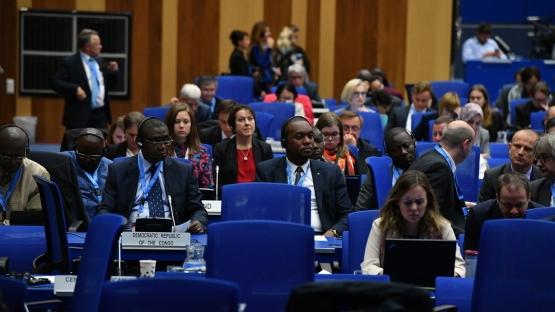During the plenary session of the General Conference, 13 delegations delivered statements, which are available here.
Eleven countries have been newly elected to serve on the 35-member IAEA Board of Governors for the period 2017-2018.
The following side events took place on Thursday:
The event Monitoring contaminants for safer seafood provided an overview of techniques to monitor biotoxins in harmful algal blooms and contaminants like mercury, polychlorinated biphenyls and plastics in our oceans and in seafood.
The event Neuropsychiatry: The Revolution of Molecular Imaging in Alzheimer’s Disease looked at the rapid progress of functional and structural brain imaging and the vital role the latter plays in the differential diagnosis of dementia, early recognition of progressive dementia, and monitoring of disease progression and treatment effect.
The event Molybdenum-99/Technetium-99m: Current Supply Scenario, New Alternatives for their Production and the Role of the IAEA outlined the current supply scenario of molybdenum-99, the alternative production routes for molybdenum-99 and technetium-99m and the role of the IAEA in supporting Member States to improve their production capacity.
The annual event of the Senior Regulators’ Meeting provided for the exchange of information on current regulatory issues and trends among senior government officials involved in regulatory matters in the fields of nuclear, radiation, transport and radioactive waste safety and nuclear security.
ESPACE presentations
The presentation on The IAEA Dosimetry Laboratory: What Do We Do About Radiation Doses in Medicine? highlighted how postal dose audits help Member States ensure the proper treatment of cancer patients and the prevention of radiation accidents. The IAEA’s Dosimetry Laboratory provides countries around the world with cost-free calibrations and quality audits via post.
The presentation on Nuclear Techniques to Address Environmental Challenges illustrated how nuclear and isotopic techniques can be used to accurately detect, monitor, and fingerprint the source of pollutants in the environment and in organisms. It provided an overview of the IAEA Environment Laboratories in Monaco and Seibersdorf, and how they support Member States in addressing pollution from radionuclides, trace metals and organic contaminants, as well as in mitigating the impact of changes in the climate and the environment.
Other presentations showcased the IAEA E-learning platform — CLP4NET and the Nuclear Management Education — INMA Master’s Programmes.
Member States side events:
The event Regional Capacity Building Initiative Promoting Capacity Building through Resource Mobilization, organised by Indonesia, is a regional capacity building initiative to promote a regional approach to capacity building in the Asia and the Pacific for the application of nuclear science and technology.
The event Technical Cooperation and the French-Speaking World, organized by France and Morocco, was held for the group of francophone ambassadors. An outcome of the event has been the establishment of a network of French-speaking experts involved in IAEA activities and in particular its technical cooperation programme.
Other activities:
Signing of Country Programme Frameworks (CPF)
A CPF is the frame of reference for the medium-term planning of technical cooperation between a Member State and the IAEA and identifies priority areas where the transfer of nuclear technology and technical cooperation resources will be directed to support national development goals.
Permanent Representative of Algeria to the IAEA, Faouzia Mebarki and Dazhu Yang, IAEA Deputy Director General and Head of the Department of Technical Cooperation, signed Algeria’s Country Programme Framework for the period of 2018–2023.
The Secretary General of Thailand’s Office of Atoms for Peace, Atchara Wongsaengchan and Dazhu Yang, IAEA Deputy Director General and Head of the Department of Technical Cooperation, signed Thailand’s Country Programme Framework for the period of 2017–2022.


